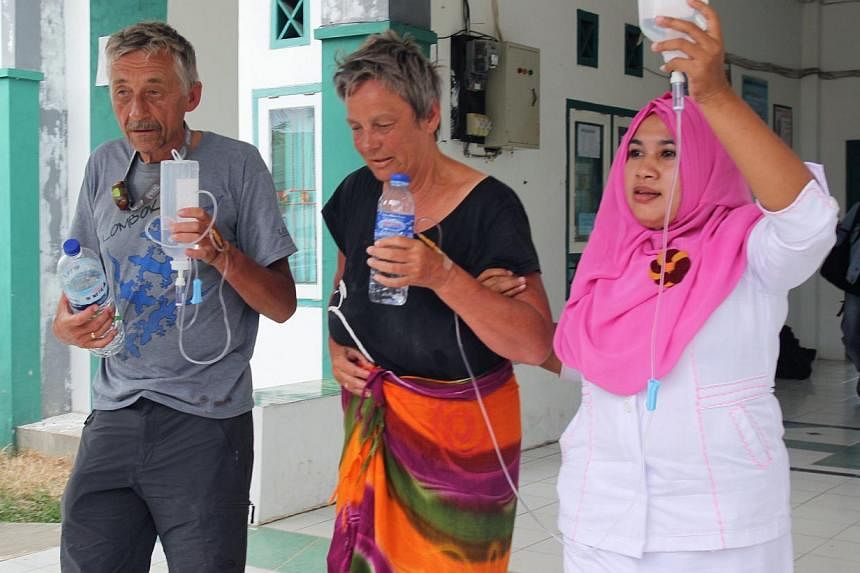SAPE, Indonesia (AFP) - Thirteen people lost at sea for two days when their tourist boat sank in Indonesia were rescued on Monday after a horrific ordeal that had forced other survivors to swim to a volcanic island and drink their own urine.
Two Spanish men were still missing after the boat, which was also carrying Indonesian crew, sank Saturday as it made the long voyage from Lombok island to Komodo island, a popular tourist destination.
The vessel went down slowly, breaking up into pieces, close to tiny Sangeang island after running into a reef and being hit by a storm. But there was no communications equipment on board to radio for help. A first group of 10 foreigners of various nationalities including Britons, Germans and Italians, was rescued on Sunday.
A French survivor told how they perched on the roof of the boat for hours the previous day as it sank, and eventually decided to swim to an island on the horizon, even though a volcano on it was emitting smoke at the time. Mr Bertrand Homassel told AFP it took them hours to swim to the island, but they had no choice as the vessel's single lifeboat only had room for a handful of people. "The others climbed onto the roof of the boat, which had not completely sunk," he said.
"We were 5km from the coast - there were many big waves separating us from the coast.
"People started to panic... Everyone took the decision to swim to the closest island five kilometres away, where there was an erupting volcano."
They managed to reach the island after swimming for six hours, only to find it deserted.
Dehydrated and sunburnt after being exposed to the fierce Indonesian sun for such a long time, they resorted to drinking their own urine and eating leaves to survive overnight on the island, Mr Homassel said.
They were rescued the next day by a passing boat and taken to nearby Sumbawa island, where they are receiving medical treatment and recovering. "I was really very lucky," the Frenchman added.
The second group rescued on Monday was made up of eight foreigners, four Indonesian crew and an Indonesian tour guide. Several were in the lifeboat when the vessel went down while others put on life jackets and swam alongside.
Dutchman Jan van Ommen, recovering in Sape town on Sumbawa, said they were in the water for about 40 hours, and took it in turns to spend stints in the lifeboat and floating in the water wearing the life jackets.
"So we had this system, and in the beginning it was not easy ... but later on the system went on, and we changed and changed," he said.
He recalled how the crew started panicking on Friday night when the boat was hit by a storm and began taking on water.
"The crew came out shouting 'Very dangerous situation'" as water started gushing into the boat, he said.
Budiawan, search and rescue chief on Lombok, said the second group was found early Monday, floating about 100km off the coast of Sumbawa.
None of those rescued have serious injuries, officials said.
An immigration official on Sumbawa said the second group were "quite weak as they didn't eat or drink for several days in the sea. They have minor injuries like scratches".
The boat was carrying 25 people. The foreigners rescued were from New Zealand, Britain, Spain, the Netherlands, Germany, France and Italy.
A search for the two Spanish men still missing was under way Monday, with the military and police involved.
Komodo island is one of several islands that make up the Komodo National Park, a protected area. Its eponymous lizards can grow up to three metres (10 feet) long and have a venomous bite.
Indonesia relies heavily on boats to connect its more than 17,000 islands, but has a poor maritime safety record. However, boat sinkings involving foreign tourists are rare.

